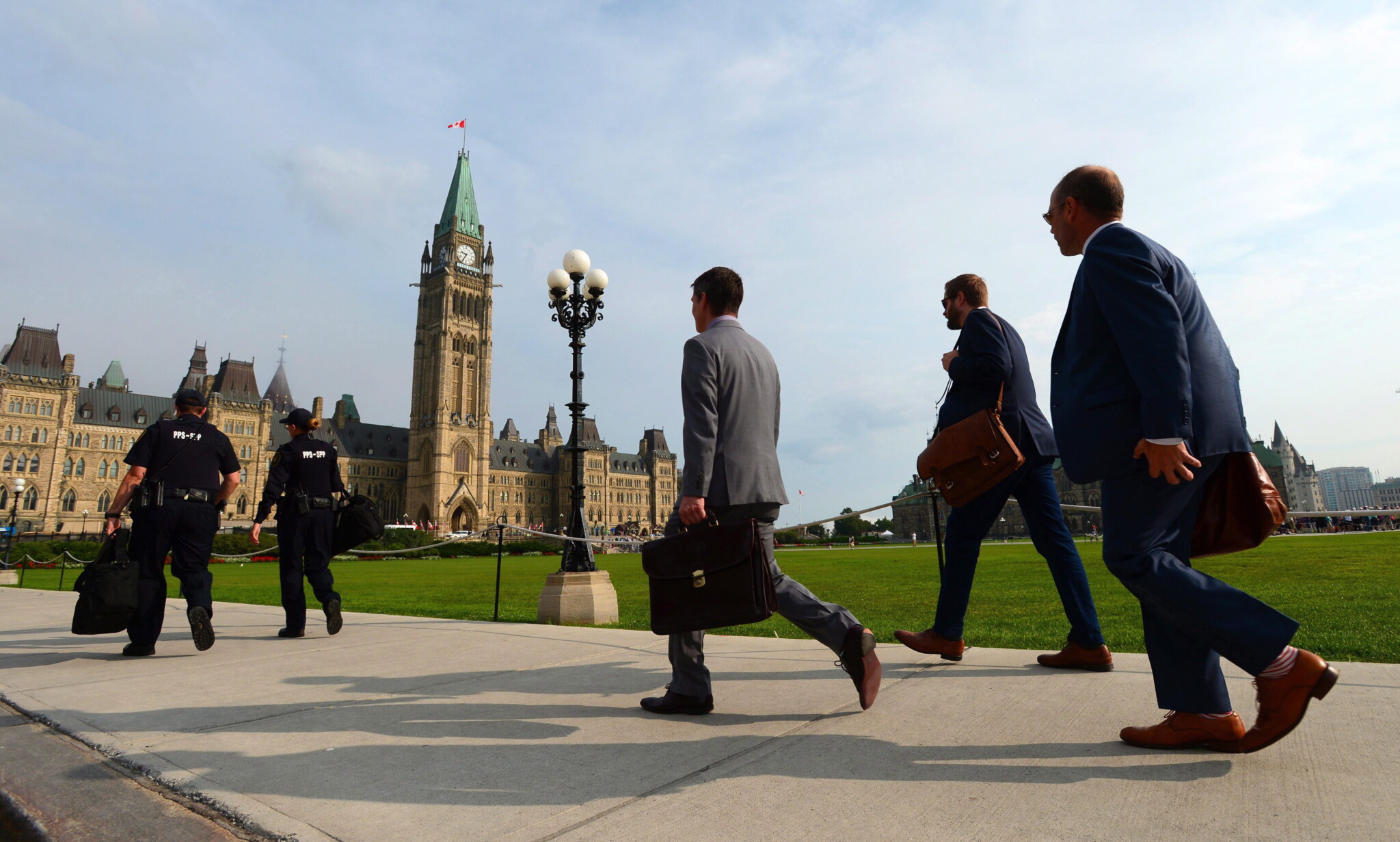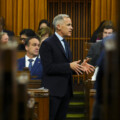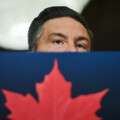Today, after an eventful summer break featuring an NDP carbon tax climbdown, a torn up Supply and Confidence Agreement, a historic byelection Liberal loss, resignations, cross-country leadership tours, and early election whispers, Canada’s 338 MPs will be returning to their seats in the House of Commons.
The Hub has collected insights from a handful of wise political insiders from across the political spectrum to get their sense of the state of political play this parliamentary session.
Why are we wasting our time? Call an election already, Liberals
By Howard Anglin, former deputy chief of staff to Prime Minister Stephen Harper, now a doctoral student at Oxford University
My mother never graduated from high school. (I hope she won’t mind me revealing that). Until Grade 12, she travelled by train twice a year, five days each way, from Vancouver to attend school in Toronto. Back then, Ontario schools still went up to Grade 13, but because B.C. did not offer a 13th year, you could apply to The University of British Columbia straight after Grade 12. Which is what she did. It took Ontario another 30 years to realize the triskaidekan year was a waste of time and cancel it.
My point: the fourth year of a minority government is Grade 13. No one wants another year of this government and no one needs it. Everyone is ready to move on. It’s a superfluous temporal appendage, a political limbo in which Parliament will spin its wheels waiting for what everyone knows is coming sooner or later. I doubt a single one of the Liberal caucus members press-ganged to the Nanaimo caucus retreat to wave the red flag with the spontaneous enthusiasm of North Korean cheerleaders is looking forward to it. Canadians as a whole are dreading it. Trudeau needs to put us all out of our misery. Cancel the year and graduate straight to the election.
Betrayal, delusion, and disease
By Scott Reid, former communications director for Prime Minister Paul Martin, now a principal and co-founder of Feschuk.Reid
Minority Parliaments are a breeding ground for risk, betrayal, delusion, disease, ambition, and irrational decision-making. So, welcome back to all of that.
For the Liberals, the dissolution of their political pact with the NDP means the threat of an unintended election now lurks constantly. Every count must be perfect. Every vote must be calculated. Committees are grenades waiting to have their pins pulled. I’ll be watching carefully to see how the government navigates this newly treacherous terrain.
How does it manage its way forward even as low polling numbers weaken its leverage and undermine its ability to say “no” to opponents’ demands? But by far the most important question remains: “How does the prime minister return his party to a competitive electoral position?”
What change might he present to voters that could persuade them to reconsider their resistance to the Liberals? Since the loss of the Toronto-St. Paul’s by-election, this has been the great unaddressed question of Canadian politics. Now, the prime minister must somehow produce an answer in the loud swirl of a Parliament that has become far more hostile and much less stable. Failure to do so could mean this becomes the last session of Parliament over which Justin Trudeau presides.
Beware of procedural rapids
By Jordan Leichnitz, veteran NDP strategist and deputy chief of staff to the NDP leader, now running the Friedrich Ebert Stiftung’s Canadian program
Rough waters ahead.
After a sleepy summer, the sense of stagnation in the federal political scene is gone. The NDP’s surprise move to blow up the Supply and Confidence Agreement has kicked off a new dynamic in Parliament. The return to the daily slog of a traditional minority government will pull the Liberals deeper into procedural battles and vote calculations and further from the outward focus on connecting to Canadians that they need if they’re to have any hope of a reboot.
While Poilievre and the Conservatives are eager to set the table for a snap election, the NDP and Bloc will calculate their moves carefully. The NDP has no interest in handing the government to the Conservatives, so expect them to use the fall to further distance themselves from Prime Minister Trudeau in the public eye, while trying to eclipse the Liberals as the only viable alternative for voters opposed to the Conservatives.
While there’s not an election on the immediate horizon, the timeline has certainly moved up. This should put more pressure on the Liberals to re-evaluate all parts of their current strategy, but so far the message from the top is simply a doubling down on more of the same. The ball is in Prime Minister Trudeau’s court and everything argues for his exit.
A hot mess
By Andrew MacDougall, former director of communications for Prime Minister Stephen Harper, now director at Trafalgar Strategy
It’s Hurry Up and Wait time, where the word “election” will be on everybody’s lips but in nobody’s actions, bar one party: Pierre Poilievre’s Conservatives.
Poilievre is jonesing for an election. Motions of no confidence will be flying out of his caucus. But what if no one else wants to dance?
Justin Trudeau is in full “Baghdad Bob” mode, declaring himself and his caucus united and focused on their jobs, when anyone with eyes and ears knows that isn’t true.
Jagmeet Singh has spent the days since tearing up his agreement with Trudeau looking weak over what he might actually do about the guy he says he thinks is “too weak” to run the country.
And the Bloc Quebecois? A weak prime minister who doesn’t want an election and is looking for friends? That’s the stuff of orgiastic dreams. They will want this parliament going for as long as possible.
And so, Baghdad Bob and his retreating Liberal army will cling to their palaces for as long as they can. Liberals saw what happened to former U.K. PM Rishi Sunak when he chose to face the electoral buzzsaw early, and it wasn’t pretty.
Result? We’re in for another year of this mess.

Prime Minister Justin Trudeau responds to a question during question period in House of Commons on Parliament Hill in Ottawa on Tuesday, June 18, 2024. Sean Kilpatrick/The Canadian Press.
Keeping the power to speak freely
Peter Menzies, senior fellow at The Macdonald-Laurier Institute, and a former newspaper executive and vice chair of the CRTC
People who want the freedom to watch and listen to what they like without the interference of government and its appointees need to sharpen their pencils, look to the front of the class and pay attention when Parliament and its agencies get back to school this week.
Most likely to grab the attention will be the continued progress of the Online Harms Act, an authoritarian wolf hidden beneath the sheep’s clothing of the worthy goal of children’s online safety. As is, the act would create a new regulator to oversee social media’s ability to protect children and youth, empower the Human Rights Commission to impose fines for speech that offends, and amend the Criminal Code to make it possible to be sentenced to life in prison for hate speech.
The bill was constructed in a way that allows the government to accuse those who oppose it of being unwilling to crack down on child pornography and abuse. The Conservatives believe they have developed the framework for alternative legislation—the framework for which was released last week—that will protect children and freedom of expression.
Therein lies the fight, the fury and the battle for the future of a safe, yet free internet, and the tension between liberty and authoritarianism.
A political bloodbath
By Kathleen Monk, former director of communications for NDP leader Jack Layton, now a principal at Monk + Associates
Never before have our political leaders been so unpopular with so many voters. As they prepare to clash in the House of Commons this week, parliamentary watchers should brace for a fall session that promises more heat than light.
Add to that provincial elections in British Columbia, Saskatchewan, and New Brunswick, and we can expect the political temperature to reach a fever pitch.
Jagmeet Singh and the New Democrats, newly liberated from their Liberal pact, are gambling big. They’re betting their freedom will translate into a surge of supporter enthusiasm and a flood of cash. But to capitalize, they must use the fall session to unmask Pierre Poilievre, painting the Conservatives as obstructionists hell-bent on slashing vital programs.
Poilievre, the Conservative ringmaster, will use Question Period as his personal colosseum. His strategy? A relentless barrage against Trudeau and other party leaders. Behind closed doors, it’s scorched earth tactics: block, stall, repeat.
Poilievre paints a picture of a “broken Canada” while his actions threaten to shatter what’s left. He’ll burn through Conservative coffers, casting himself as the people’s champion. Meanwhile, he’ll throw wrenches into the parliamentary gears, blocking any actual relief for those crushed by inflation.
The Liberals find themselves in a precarious juggling act. They’re desperately trying to cast Poilievre as the bogeyman. Trudeau is attempting a political Jedi mind trick: trying to convince people that Poilievre isn’t the change they’re looking for. But can the Liberals pull off this sleight of hand while simultaneously wrestling with the realities of governance?
So, what do I think we will see? New Democrats taking initiative, Conservatives on the offence, and Liberals responding to one bad news story after another. Last week it was another MP calling for Trudeau to step aside, the Liberal campaign director quitting in despair, polls underwater. What bad news will next week bring? This is the backdrop for what will almost certainly be a very ugly fall parliamentary session.
Brace yourselves. The stage is set for a political bloodbath this fall, and I fear there will be no winners.
Get serious
By Tyler Meredith, former lead economic advisor to Prime Minister Justin Trudeau, Bill Morneau, and Chrystia Freeland, now founding partner of Meredith Boessenkool & Phillips Policy Advisors
Inflation is down and interest rates are dropping—albeit far too slowly. But Canadians remain anxious about the direction of the world. The same story is playing out almost everywhere for every incumbent government in the developed world. And yet our policy elites are focused on a productivity discussion we’ve been endlessly talking about for three decades, with ideas that haven’t changed in two decades. Canadians don’t care about that—they want real ideas to make housing less expensive, food more affordable, and immigration more stable. As we approach less than 12 months to the next election, I’m watching to see if our leaders get more serious than the slogans we’ve heard and if our thinkers actually rise to the occasion too.
Sleeper issues
By Karen Restoule, vice president at Crestview Strategy and co-founder of BOLD Realities
While seemingly obvious issues like cost of living, housing affordability, and public transit are likely to continue to dominate the political discourse this fall, there are a few (wild) sleeper moves that could emerge when Parliament returns today—assuming that it holds up:
One. With the efforts to align Canada with the global energy transition and the noted importance of resource-abundant regions, there’s potential for the Trudeau government to make unexpected moves to support Canada’s energy sector, including oil and gas. And while, yes, Trudeau has focused exclusively on green energy in his nine years at the helm, a shift to supporting energy infrastructure—especially in oil-producing provinces—could be a surprising way to court voters impacted by inflation and high energy prices. (Unlikely to actually happen, but a girl can dream!)
Two. With discussions on private health-care solutions heating up in legislatures in Alberta and Ontario, Trudeau could ride (on a well-groomed horse, of course) into the debate with either a strong endorsement or strong opposition towards privatization. A clear and firm position on this issue could raise attention on long-standing access to health-care concerns that have dominated provincial debate and provoke debate on cost and quality of Canadian life, particularly in suburban areas. (Sure, health care falls within the province’s sandbox, but jurisdiction has never really held Trudeau back on this front.)
Three. Trudeau could resurrect promises on electoral reform in a (weak) attempt to appeal to younger and progressive voters. Sure, the NDP-Liberal marriage has lost its sizzle but it doesn’t mean that Trudeau can’t continue to fan his woke feathers to the NDP base. And sure, it’s a long shot, but if the Liberals are interested in appealing to young, disaffected voters, they might make a renewed commitment to proportional representation or other voting mechanisms as a way to regain favour with urban and suburban progressives.
These sleeper moves—whether there’s a non-confidence motion or not—could help the Liberals to shift voter dynamics, mitigate opposition gains, and/or surprise critics, allies, and Canadians by offering unexpected solutions to ongoing challenges.
Whether or not these three wild predictions happen or not, nobody should be surprised by sudden (and unique) policy pivots that appear designed to attract swing voters or address emerging issues that they may have overlooked to this point.








